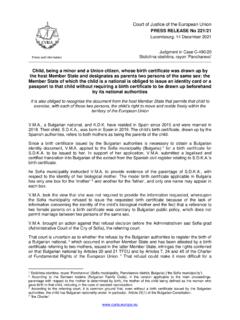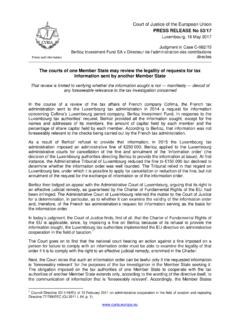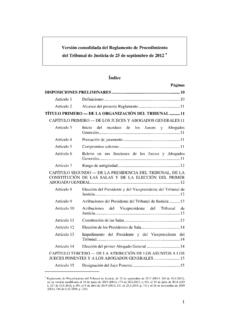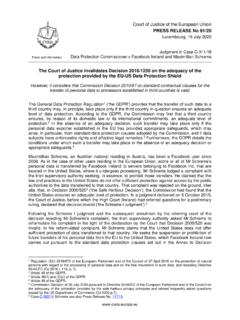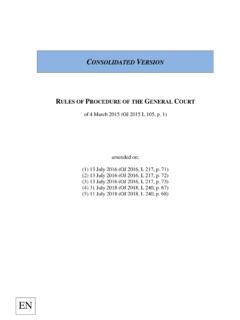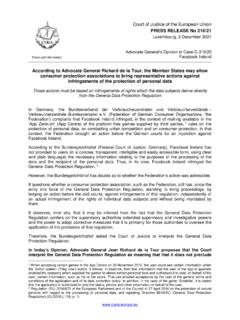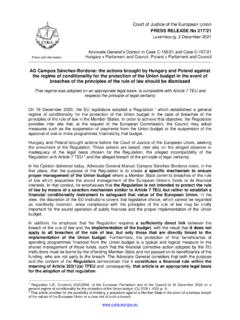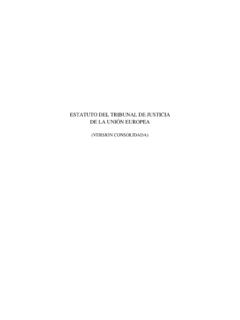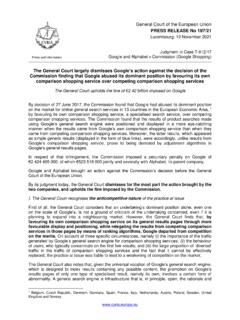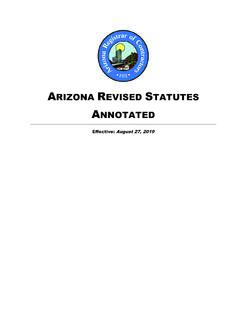Transcription of Court of Justice of the European Union PRESS RELEASE No …
1 PRESS and Information Court of Justice of the European Union PRESS RELEASE No 210/21 Luxembourg, 25 November 2021 Judgment in Case C-102/20 StWL St dtische Werke Lauf Pegnitz Inbox advertising : the display in the electronic inbox of advertising messages in a form similar to that of a real email constitutes use of electronic mail for the purposes of direct marketing within the meaning of Directive 2002/58 Those messages give rise to a likelihood of confusion that could lead a user who clicks on the link corresponding to the advertising message to be redirected, against his or her will, to an internet site displaying that advertisement St dtische Werke Lauf Pegnitz GmbH ( StWL ) and eprimo are two competing electricity suppliers.
2 At the request of eprimo, an advertising agency, distributed advertisements consisting of displaying banners in the email inboxes of users of the T-Online free email service. Those messages appeared as soon as users of the email services opened their inbox, with both the users concerned and the messages displayed being chosen at random (an advertising activity known as inbox advertising ). They were not visually distinguishable in the list from other emails in the user s account except for the fact that the date was replaced by the word Anzeige (advertisement), no sender was mentioned and the text appeared against a grey background. The subject section corresponding to that entry in the list contained text intended to promote advantageous prices for electricity and gas services.
3 StWL considered that that advertising practice involving use of email without the recipient s express prior consent was contrary to the rules of unfair competition. Accordingly, StWL commenced an action to desist against eprimo before the Landgericht N rnberg-F rth (Regional Court , Nuremberg-F rth, Germany). That Court upheld StWL s application and ordered eprimo to cease disseminating such advertising to final consumers, as it constituted an unacceptable nuisance and was misleading. On an appeal brought by eprimo before the Oberlandesgericht N rnberg (Higher Regional Court , Nuremberg, Germany), that Court considered that that advertising did not constitute an unlawful commercial practice under competition law Hearing an appeal on a point of law brought by StWL and finding that the success of the appeal depends on the interpretation of EU law, the Bundesgerichtshof (Federal Court of Justice , Germany) referred questions for a preliminary ruling to the Court of Justice .
4 It asks the Court of Justice to rule, in particular, on the question of whether and, if so, in accordance with what conditions, a practice by which advertising messages are displayed in the inbox of a user of an email account service, which is provided free of charge to that user and is funded by the advertising paid for by advertisers, may be regarded as compatible with the relevant provisions of Directives 2002/58 and 2005/29 1 1 The order for reference concerns the interpretation of Article 2(h) and Article 13(1) of Directive 2002/58/EC of the European Parliament and of the Council of 12 July 2002 concerning the processing of personal data and the protection of privacy in the electronic communications sector (Directive on privacy and electronic communications) (OJ 2002 L 201, p.)
5 37), and Annex I, point 26, to Directive 2005/29/EC of the European Parliament and of the Council of 11 May 2005 concerning unfair business-to-consumer commercial practices in the internal market and amending Council Directive 84/450/EEC, Directives 97/7/EC, 98/27/EC and 2002/65/EC of the European Parliament and of the Council and In the first place, the Court recalls that Directive 2002/58 seeks to protect subscribers against intrusion into their privacy by unsolicited communications for the purpose of direct marketing, in particular by means of automated calling machines, telefaxes, and emails, including SMS messages. That objective must be ensured regardless of the technologies used, which is why it is necessary to adopt an interpretation that is broad and evolving from a technological perspective of the type of communications covered by that directive.
6 Taking into account the distribution methods of the advertising messages at issue in the main proceedings, the Court of Justice considered that proceeding in that manner constitutes a use of electronic mail likely to breach the objective of protecting users from any intrusion into their private life by unsolicited communications for the purposes of direct marketing. In the second place, the very nature of the advertising messages at issue in the main proceedings, which promote services, and the fact that they are distributed in the form of an email allows those messages to be classified as communications for the purposes of direct marketing . According to the Court of Justice , the fact that the recipient of those advertising messages is chosen at random is irrelevant; what matters is that there is a communication for a commercial purpose, which reaches, directly and individually, one or more email service users.
7 In the third place, the Court states that the use of e-mails for the purposes of direct marketing is allowed, on condition that its recipient has given prior consent. Such consent must be indicated in a manifestation of a free, specific and informed wish on the part of the person concerned. The T-Online email service is offered to users in the form of two categories of email services, namely, first, a free email service funded by advertising and, second, a paid-for email service, without advertising. The Court therefore considered that it is for the referring Court to determine whether the user concerned, having opted for the free T-Online email service, was duly informed of precise means of distribution of such advertising and in fact consented to receiving advertising messages.
8 In the fourth place, although the Court observes that the display of those advertising messages in the list of the user s private emails impedes access to those emails in a manner similar to that used for unsolicited emails (also known as spam ), it nevertheless stresses that Directive 2002/58 does not impose a requirement for it to be found that the burden on user is greater than a nuisance. At the same time, the Court finds that such a display of advertising messages imposes, in any event, a burden on the user concerned. Finally, the Court considers that an practice consisting of the display in the inbox of an email service user of advertising messages in a form similar to that of real emails falls within the concept of persistent and unwanted solicitations of Directive 2005/29, if the display of those advertising messages, first, is sufficiently frequent and regular to be classified as persistent and, second, it may be classified as unwanted in the absence of consent having been given by that user prior to that display.
9 NOTE: A reference for a preliminary ruling allows the courts and tribunals of the Member States, in disputes which have been brought before them, to refer questions to the Court of Justice about the interpretation of European Union law or the validity of a European Union act. The Court of Justice does not decide the dispute itself. It is for the national Court or tribunal to dispose of the case in accordance with the Court s decision, which is similarly binding on other national courts or tribunals before which a similar issue is raised. Unofficial document for media use, not binding on the Court of Justice . The full text of the judgment is published on the CURIA website on the day of delivery. PRESS contact: Jacques Ren Zammit (+352) 4303 3355 Pictures of the delivery of the judgment are available from "Europe by Satellite" (+32) 2 2964106 Regulation (EC) No 2006/2004 of the European Parliament and of the Council ( Unfair Commercial Practices Directive ) (OJ 2005 L 149, p.)
10 22).
